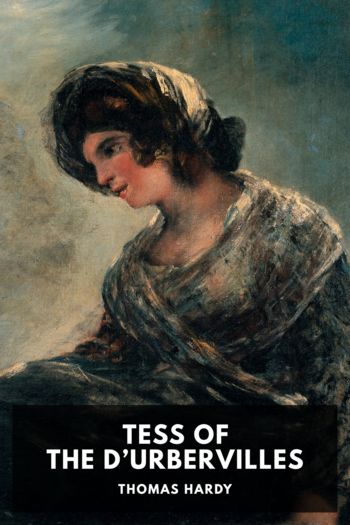Tess of the d’Urbervilles - Thomas Hardy (best color ereader .txt) 📗

- Author: Thomas Hardy
Book online «Tess of the d’Urbervilles - Thomas Hardy (best color ereader .txt) 📗». Author Thomas Hardy
Clare knew her well. He could not be sure that she observed him; he hoped she did not, so as to render it unnecessary that he should go and speak to her, blameless creature that she was. An overpowering reluctance to greet her made him decide that she had not seen him. The young lady was Miss Mercy Chant, the only daughter of his father’s neighbour and friend, whom it was his parents’ quiet hope that he might wed some day. She was great at Antinomianism and Bible-classes, and was plainly going to hold a class now. Clare’s mind flew to the impassioned, summer-steeped heathens in the Var Vale, their rosy faces court-patched with cow-droppings; and to one the most impassioned of them all.
It was on the impulse of the moment that he had resolved to trot over to Emminster, and hence had not written to apprise his mother and father, aiming, however, to arrive about the breakfast hour, before they should have gone out to their parish duties. He was a little late, and they had already sat down to the morning meal. The group at the table jumped up to welcome him as soon as he entered. They were his father and mother, his brother the Reverend Felix—curate at a town in the adjoining county, home for the inside of a fortnight—and his other brother, the Reverend Cuthbert, the classical scholar, and Fellow and Dean of his College, down from Cambridge for the long vacation. His mother appeared in a cap and silver spectacles, and his father looked what in fact he was—an earnest, God-fearing man, somewhat gaunt, in years about sixty-five, his pale face lined with thought and purpose. Over their heads hung the picture of Angel’s sister, the eldest of the family, sixteen years his senior, who had married a missionary and gone out to Africa.
Old Mr. Clare was a clergyman of a type which, within the last twenty years, has well nigh dropped out of contemporary life. A spiritual descendant in the direct line from Wycliff, Huss, Luther, Calvin; an Evangelical of the Evangelicals, a Conversionist, a man of Apostolic simplicity in life and thought, he had in his raw youth made up his mind once for all in the deeper questions of existence, and admitted no further reasoning on them thenceforward. He was regarded even by those of his own date and school of thinking as extreme; while, on the other hand, those totally opposed to him were unwillingly won to admiration for his thoroughness, and for the remarkable power he showed in dismissing all question as to principles in his energy for applying them. He loved Paul of Tarsus, liked St. John, hated St. James as much as he dared, and regarded with mixed feelings Timothy, Titus, and Philemon. The New Testament was less a Christiad then a Pauliad to his intelligence—less an argument than an intoxication. His creed of determinism was such that it almost amounted to a vice, and quite amounted, on its negative side, to a renunciative philosophy which had cousinship with that of Schopenhauer and Leopardi. He despised the Canons and Rubric, swore by the Articles, and deemed himself consistent through the whole category—which in a way he might have been. One thing he certainly was—sincere.
To the aesthetic, sensuous, pagan pleasure in natural life and lush womanhood which his son Angel had lately been experiencing in Var Vale, his temper would have been antipathetic in a high degree, had he either by inquiry or imagination been able to apprehend it. Once upon a time Angel had been so unlucky as to say to his father, in a moment of irritation, that it might have resulted far better for mankind if Greece had been the source of the religion of modern civilization, and not Palestine; and his father’s grief was of that blank description which could not realize that there might lurk a thousandth part of a truth, much less a half truth or a whole truth, in such a proposition. He had simply preached austerely at Angel for some time after. But the kindness of his heart was such that he never resented anything for long, and welcomed his son today with a smile which was as candidly sweet as a child’s.
Angel sat down, and the place felt like home; yet he did not so much as formerly feel himself one of the family gathered there. Every time that he returned hither he was conscious of this divergence, and since he had last shared in the Vicarage life it had grown even more distinctly foreign to his own than usual. Its transcendental aspirations—still unconsciously based on the geocentric view of things, a zenithal paradise, a nadiral hell—were as foreign to his own as if they had been the dreams of people on another planet. Latterly he had seen only Life, felt only the great passionate pulse of existence, unwarped, uncontorted, untrammelled by those creeds which futilely attempt to check what wisdom would be content to regulate.
On their part they saw a great difference in him, a growing divergence from the Angel Clare of former times. It was chiefly a difference in his manner that they noticed just now, particularly his brothers. He was getting to behave like a farmer; he flung his legs about; the muscles of his face had grown more expressive; his eyes looked as much information as his tongue spoke, and more. The manner of the scholar had nearly disappeared; still more the manner of the drawing-room young man. A prig would have said that he had lost culture, and a prude that he had become coarse. Such was the contagion of domiciliary fellowship with the Talbothays nymphs and swains.
After breakfast he walked with his





Comments (0)